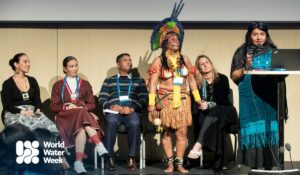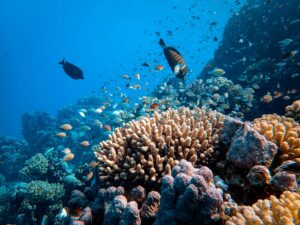How can we progressively realize the human right to a clean, healthy, and sustainable environment to better protect water resources – including groundwater, wetlands, and the oceans? Swedish Water House's recent webinar discussed the steps required for implementation and enforcement of this right.
We live in a world where we are increasingly experiencing too much, too little, or too polluted water. Never has it been more critical to protect freshwater, from its biodiversity and ecosystems services, to the water bodies that feed our drinking water supplies. In the past year, the UN Human Rights Council and the General Assembly have recognized a clean, healthy, and sustainable environment as a human right. Their resolutions, passed in October 2021 and July 2022 respectively, acknowledge the right to a healthy environment (HRHE) as critical to address the multiple threats against the planet and to people’s health.
This webinar was the second in a series, which explores how to advance the application of a human rights-based approach that safeguards all water-related human rights, ensuring that no one is left behind. The first webinar in the series was held in January 2022.
To achieve the HRHE, the implementation aspects are as important as the formal right itself. The HRHE is not in itself a new and autonomous entitlement with corresponding obligations; rather, it draws on the environmental law, customary rights, and multilateral agreements that already exist, whilst adding a distinct human rights lens to them. But achieving the HRHE requires more ambitious application than we see today as the main responsibility for passing and enforcing environmental laws and regulation lies mostly with governments. For the successful implementation of the HRHE, many other actors must also play important roles.
The webinar’s keynote speaker Jonas Ebbesson noted that much relevant development has already been seen in international law on procedural and participatory rights and environmental matters. This paves the way for the new resolutions to be used and invoked during legal proceedings. International human rights bodies will refer to them in forthcoming decisions, whereas international courts could use them directly. National courts may use the HRHE when applying and interpreting their national laws on environment, health, and water resources protection.
The thousands of recent lawsuits in the climate change arena serve as an example of how international law can be effectively used, and how NGOs and civil society can refer to human rights law to promote participation and enforcement of the Paris Agreement. Other functions of the international law system include, for example, the Convention Compliance Committees which can further the implementation of the HRHE by operating in a similar fashion to a court.
The HRHE is not implemented by the UN, and human rights do not need to be formally outlined in a country’s constitution for the HRHE to be effective. And whilst the international level can inspire, it is actually the formal organizations that are responsible for the implementation of the HRHE as their work is determined by the policy and law that gives them mandates. Realization happens when the daily practice of institutions integrates human rights, and different systems function at their respective levels.
Panellists Hanna Neumeyer and Jessica Troell both brought attention to local institutions and their different roles in enforcement to ensure water resources are managed sustainability. They highlighted how most local organizations want to do the right thing but they need a helping hand to work more strategically. Many struggle to work with human rights as they are often perceived as too abstract and as such, they need help from the human rights community to translate human rights principles into clear objectives that can be used as guidance. For instance, a rights-based perspective ensures that the most vulnerable – such as indigenous people and women – are prioritized. In this example, there is a need to strengthen the capacities of the different stakeholders so that they can facilitate the participation of all concerned communities, including indigenous people and women, allowing for more meaningful engagement in decision-making. Clear guidelines, however, on what the HRHE requires in relation to water resources may be needed.
The HRHE applies alongside the human rights to water and sanitation (HRWS), which were recognized in 2010. Panellist Leo Heller stressed how they all complement each other and how they, and the other water-related human rights, need to be addressed in an integrated way without missing the identity or details of each right. The HRHE has a wider scope than the other rights, but we must ensure that drinking water needs are prioritized over other water requirements, for irrigation and food production for example.
Whilst there are multiple ways to protect communities’ interests in water resources, there are still many legal gaps. It is therefore important to note the inherent linkages between water and land, forests, fisheries, etc., and to add the water tenure concept to the discussion of water resources protection and usage. Tenure is the idea that there is a set of relationships that can be defined legally or customarily between people as individuals, groups, or communities with respect to ‘their’ water resources. Conventional water rights are often legally dependent on formal land or forest rights, which are seldom held by women. The concept of tenure can enhance women’s access to water and improve gender equality, as well as contribute to more effective water resources stewardship. Integration of water tenure can also allow for investments in conservation of nature resources, for instance, to monetize protection of ecosystem services.
National water laws may need reform to effectively realize the HRHE, whilst institutional and legal fragmentation remains challenging. Most countries have not yet been able to effectively integrate water management at the national level, whilst different sectors often work in silos, independently of one another. This undermines the ability for countries to plan and manage their water resources, both to prioritize vulnerable populations and their access to water, but also more broadly to protect water resources. To realize the HRHE, we must move away from the current narrow focus of water, sanitation and hygiene (WASH) being closely interlinked with SDG 6.1–2, to a wider perspective, which includes water resources.
In the discussion about different groups and actors pushing for realization of the right to a healthy environment, SIWI’s Georgette Mrakadeh-Keane emphasized how youth play a key role. They function as right bearers and as rights protectors or enforcers, also with respect to the human rights of children and those of future and unborn generations. Upholding the HRHE is inextricably about the future, about ensuring there will be a healthy environment for generations to come. It could and should be a driving force to lead societies towards a long-term respect for living things.
It is crucial that everyone, including youth, is not only aware of the threats of climate change, water pollution, and biodiversity loss, but that they also understand what actions need to be taken, and what measures can and should be used to protect these actions.
Corporate responsibility is also required to achieve the HRHE, albeit not a legally binding requirement. References to human rights can be made as part of a corporate strategy, to instil a sense of obligation not only in institutions that carry formal duties, but also to hold the private sector accountable for actions that impact on water resources.
A follow-up webinar may focus on the aspects of business and human rights in relation to the HRHE.








